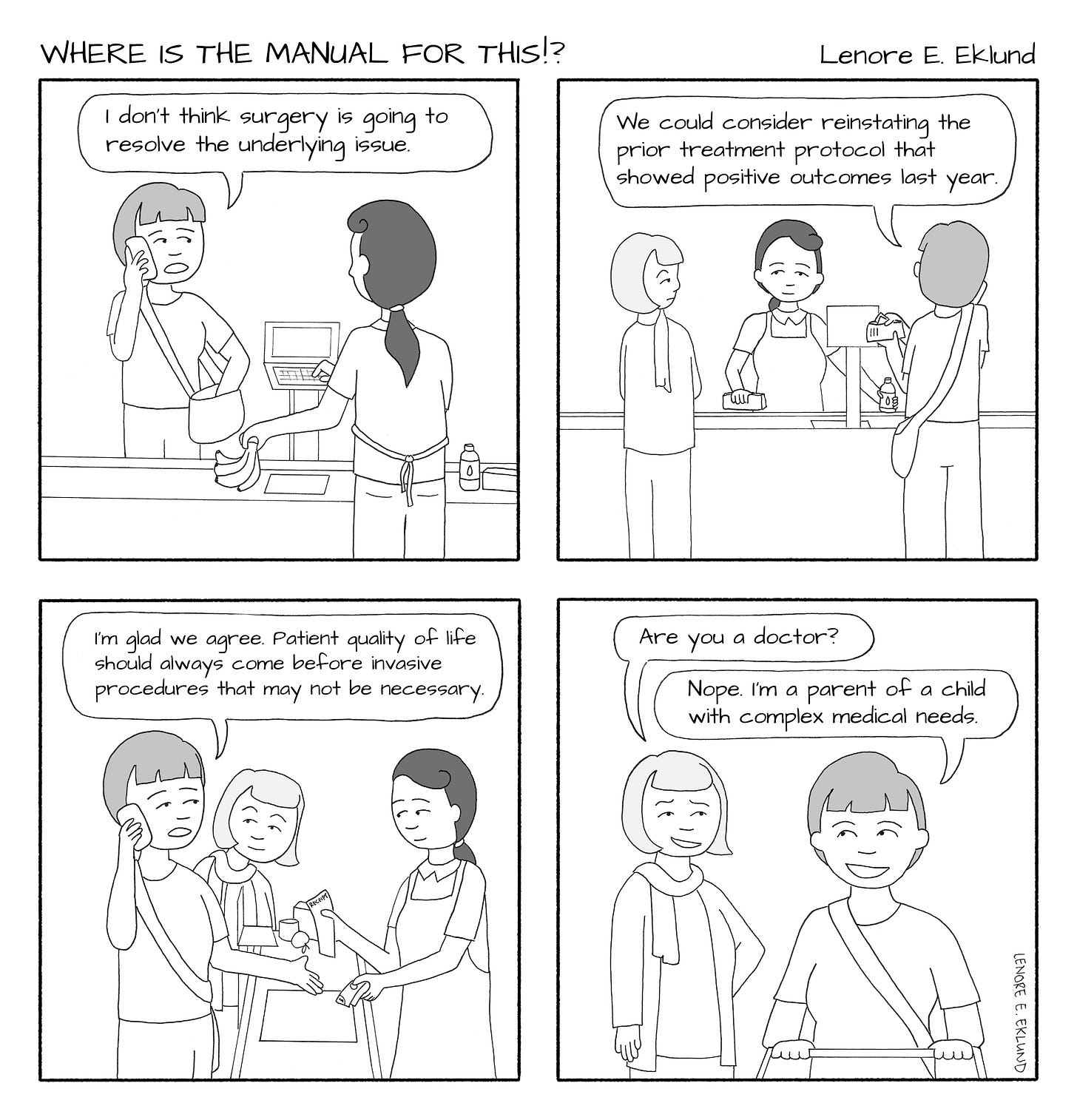Maybe she's a doctor. Maybe it's medical motherhood.
Plus: National study declares crisis in family caregiving; A life-changing drug for Prader-Willi; Study shows health toll of raising disabled children
Hopefully 'I’m not the only one who remembers the old “Maybe she’s born with it. Maybe it’s Maybelline.” commercial that was the inspiration for this week’s headline. My TikTok algorithm definitely thinks I’m some sort of medical professional, judging by the content it sends me. Ironic, since I’ve never had any formal training at all in medicine. In my children’s early years, I remember thinking often that my life as a medical mom felt like being drafted — but into a college-level course of neuroscience, physical therapy and nursing skills. It wasn’t how I wanted to spend my time, but: duty calls.
On the second Sunday of every month, we feature Where is the Manual for This?!, an editorial cartoon about the medical mom life from Lenore Eklund.
Medical Motherhood’s news round up
Snippets of news and opinion from outlets around the world. Click the links for the full story.
• From KHON: “Family caregiving in Hawaii at ‘high-risk’ according to new study”
A new scorecard assessed the urgency of local caregiving needs and categorized all 50 states. The study is called “America’s Unseen Workforce: The State of Family Caregiving.”
Conducted by the Columbia University Mailman School of Public Health, the study found nearly half the nation is on the brink of a caregiving emergency.
Four categories are listed: well-supported, safe for now, high-risk and critical. The study found Hawaii was “high-risk,” which means the situation requires prompt attention.
“The study basically tells us what we’ve known for Hawaii’s demographics. You know, Baby Boomers are getting older and to the age where many of them need caregiving,” said State Director of AARP Hawaii, Keali’i Lopez.
[…]She continues to say there’s been progress made in workforce development, with officials looking into education loan programs for healthcare providers and even workforce housing. But more needs to be done in terms of policies.[…]
• From KFF News via DisabilityScoop: “A Revolutionary Drug For Extreme Hunger Transforms Life For Those With Prader-Willi”
Ali Foley Shenk still remembers the panic when her 10-year-old son, Dean, finished a 20-ounce box of raisins in the seconds the cupboard was left unlocked. They rushed to the emergency room, fearing a dangerous bowel impaction.
The irony stung: When Dean was born, he was so weak and floppy he survived only with feeding tubes because he couldn’t suck or swallow. He was diagnosed as a baby with Prader-Willi syndrome — a rare disorder sparked by a genetic abnormality. He continued to be disinterested in food for years. But doctors warned that as Dean grew, his hunger would eventually become so uncontrollable he could gain dangerous amounts of weight and even eat until his stomach ruptured.
[…]In March, the Food and Drug Administration approved Vykat XR, an extended-release version of the existing drug diazoxide choline, which eases the relentless hunger and may offer insights into the biology of extreme appetite and binge eating. This breakthrough for these patients comes as other drugs are revolutionizing how doctors treat obesity, which affects more than 40% of American adults. GLP-1 agonist medications Ozempic, Wegovy, and others also are delivering dramatic results for millions.
[…]Jennifer Miller, a pediatric endocrinologist at the University of Florida who co-led the Vykat XR trials, treats around 600 Prader-Willi patients, including Dean. She said the impact she’s seen is life-changing. Since the drug trial started in 2018, some of her adult patients have begun living independently, getting into college, and starting jobs — milestones that once felt impossible. “It opens up their world in so many ways.”[…]
• From India Today: “NIT Rourkela study reveals health toll on parents of children with disabilities”
A recent study by researchers at NIT Rourkela has brought attention to a pressing issue that often goes unnoticed, how raising children with developmental disabilities takes a serious toll on the physical and emotional well-being of parents, especially mothers.
[…]Surveying over 400 parents of children with autism, ADHD, cerebral palsy, and multiple disabilities, the research found that the daily caregiving demands often lead to chronic headaches, fatigue, pain, ulcers, and a feeling of being emotionally worn out.
The impact on physical health, the study shows, is not just a result of stress, it can also make stress harder to manage, creating a feedback loop that further weakens a caregiver’s capacity.
[…]Their findings reveal that while physical health is a key factor, financial pressures and social isolation also play major roles. Many parents, especially in India, struggle with stigma, lack of awareness, and minimal access to support services.
Speaking on the findings, Dr [Ramakrishna] Biswal said: “Disability rights are increasingly recognised, but caregivers remain overlooked. Raising such children is not just a parental duty, it’s a shared responsibility of the entire community.”[…]
Medical Motherhood brings you quality news and information each Sunday for raising disabled and neurodivergent children. Get it delivered to your inbox each week or give a gift subscription. Subscriptions are free, with optional tiers of support. Our paid subscribers make this work possible! Not ready to subscribe but like what you read here? Buy me a coffee.
Follow Medical Motherhood on Facebook, Bluesky, X, TikTok, Instagram or Pinterest. Visit the Medical Motherhood merchandise store.



